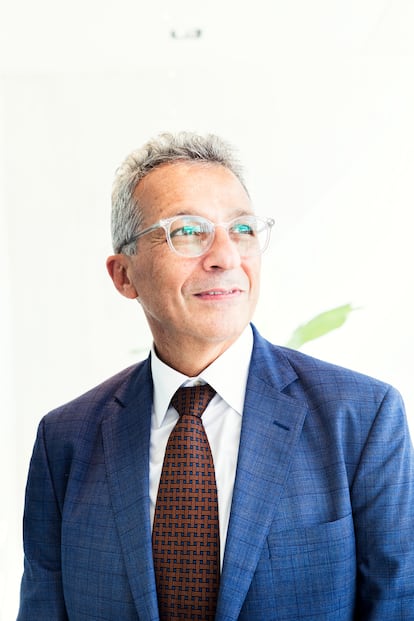Álvaro Pascual-Leone, 64, doesn’t believe it’s likely that advances in neuroscience will turn us into superhumans with enhanced brain capacities, at least in the short term.
“The human nervous system has been designed as an optimized machine, for swimming and storing clothes. If you swim very well, or modify the brain for that purpose, you’re more likely to have your clothes stolen,” says Pascual-Leone, a professor of neurology at Harvard Medical School in the United States. “In many ways, I think we’re going to realize that it’s a zero-sum game; what you win on one side, you lose on the other,” adds the scientist, who is in Madrid to participate in a conference held by the Confederation of Scientific Societies of Spain (COSCE) at the headquarters of the Ramón Areces Foundation.
However, this expert in non-invasive brain stimulation doesn’t consider these inflated expectations about neuroscience to be a negative thing. “It’s pure cognitive science. Raising expectations and ignoring the scale of the enormous challenges ahead allows us to face them head on,” he explains.
According to Pascual-Leone, we are in a very early stage in this science, “in neuromodulation techniques, brain reading or brain modification, and in neurotechnologies in general.” “There is an almost religious belief that everything will be solved, but that won’t be the case, far from it, and solutions will be offered that we will later see only create more problems,” he adds.
“I believe we’ll have technologies to identify diseases earlier, treat them better, reduce disability, and delay their development, with significant impact, but we won’t eradicate these diseases, although I hope I’m wrong,” he continues. “But to know if this is true or not, we’re going to have to walk the path, and it’s going to happen very quickly, and it will lead to very valuable advances.”
Question. Medicine is usually dedicated to treating abnormalities, things that prevent us from reaching what is considered normal functioning, but now, much of the expectation of neurotechnologies comes from the possibility of expanding capabilities.
Answer. Regardless of where we end up, there is a shift in medicine that needs to take place. Talking about neurology as a specialty for treating brain diseases is deeply misguided. To begin with, it never was. It should always have been a specialty for treating patients with neurological diseases. But more importantly, it can’t be just that. It has to expand significantly to become the specialty that promotes disease prevention and the maximization of brain health. That requires a quite different approach, where you don’t go to the doctor to be told what to do to get better, but to be educated, helped, and guided so that you can decide what to do to stay healthy.
Q. Beyond well-known ideas such as eating well, not smoking, avoiding alcohol and drugs, exercising, maintaining good social relationships, and sleeping… is there anything that neuroscience has discovered recently that should be included in lifestyle changes to improve brain health?
A. First of all, most people still think they have time to take care of their health and that they’ll get to it when they need to, because right now they’re 25 and it’s time to party and enjoy themselves. In reality, no one can ever take away the mark it leaves on your brain.
Secondly, the most important thing we know is that we have a better understanding of how to tailor the exact type of exercise, cognitive training, diet, etc., all of those things we’ve mentioned. If you have a fever, they don’t tell you to take something; they prescribe you something specific in a dose for a particular bacterium. We have to do that with lifestyle.
 Pascual-Leone is an expert in non-invasive brain stimulation.Claudio Álvarez
Pascual-Leone is an expert in non-invasive brain stimulation.Claudio ÁlvarezQ. Regarding personalization, everyone knows that not all sports are suitable for all ages, that if there are knee injuries, maybe you should give up football, but these limits are not usually considered regarding brain capacity, perhaps because as it is hidden in our heads we are not as aware of its decline.
A. Wanting to keep your brain forever young is foolishness. Because you don’t want that. What you want is a 45-year-old brain functioning at its best at 45. There are changes in brain structure and function with age. It’s not about seeing age as decline, but as the development of your entire existence, where there are substrates that, when you’re older and have more life experience, allow you to connect seemingly disparate things to create a more global vision of the situation that you don’t have when you’re young.
What you want is for the brain’s connections to occur in a way that’s appropriate for each age. If your system is too plastic, it can be pathological, just like a lack of plasticity. What we want to achieve isn’t for you to have the brain of a 20-year-old at 60 — no way, that would be terrible.
Q. What skills are more characteristic of youth or old age?
A. Training processing capacity with those high-speed killing video games can be done, but the older brain no longer acquires or develops those skills. However, there are more global, more holistic capacities for which older people are more predisposed.
But I don’t think there’s been enough research to identify which skills are best to practice and to measure whether you’re improving those skills.
Q. Are there people who are already trying brain rejuvenation techniques?
A. There was a company called Halo that launched brain stimulation headsets to help athletes run faster and compete better. But it didn’t work well enough and went bankrupt.
There’s the concept of neurocosmetics, which says that, just like plastic surgery, we can perform plastic brain modulation so that I like my brain more. The problem, as with plastic surgery, is that it can be useful depending on the circumstances and the person, but it has an impact on the way you see yourself at the brain level. There’s a concept we have of our essence, and if you modify it, it becomes dissonant with that representation of ourselves. With dementia, the danger is that your essence is taken away, and the risk of neurocosmetic, of giving us new abilities, is it will change one’s essence.
Q. Is it possible to make improvements to the brain without causing unwanted damage?
A. I think it’s almost impossible to design a study to find out, because it would have to be extremely expensive and lengthy. The problem is that improving a skill can be easy, but it’s very difficult to know the harmful consequences of improving that skill. Because you can’t look at all the things you’d need to look at.
Then there’s the time factor. Maybe there’s something that helps you process math better, and you can measure it, but the negative consequences are that in 50 years, your chances of having a problem increase. My argument is that if you cross the river, you’ve gone too far, so it’s better to err on the side of being conservative and not cross the river. Otherwise, the risk of unforeseen consequences is very high.
Q. Sometimes, when we talk about brain enhancements, we follow a concept of what’s socially desirable, in which the important thing is to excel at something that can make you money, whether being a top engineer or an elite athlete, even if you’re clumsy in other aspects of your life. From the perspective of neuroscience, is there a broader approach to what it means to have a better or worse mind in a more global sense?
A. When these improvements are sought through neurotechnologies, the meaning of this change at the individual level is often overlooked. It is assumed that there will be no consequences, or, in the worst case, the consequences are assumed to be unimportant.
Part of the problem is that in today’s society, there is such high social pressure to achieve the results of an athlete, a politician, or any other prominent person, regardless of whether the rest of their life is a disaster. We see this in art. Jaspers wrote about the positive value of mental illness as a driver of creativity, and there are countless other examples.
If with these technologies we want to enhance humans, we need a redefinition of what it means to be human in the context of these technologies, where we have to weigh the cost of improving one aspect at the expense of others, of achieving a social benefit with a very high cost to the individual.
Q. Regarding mental illness, has there been a clear definition of what needs to be eradicated? Is there any question of whether we are treating a person for being different, forcing them to adapt to society, instead of creating a more accommodating society?
A. That depends on the definition of illness. If it’s up to the doctor to decide whether you’re ill, that’s extremely dangerous. Because that doesn’t take into account the subjective aspect of whether that change, that approach, that way of being in the world, is subjectively appropriate for you. I think we need to define illness as the WHO does, taking into account objective and subjective measures, where my brain performance, objectively, is adequate for my function, my emotional state, and I feel comfortable with that.
If the individual objectively exhibits autistic behaviors but is happy with this and wants to define themselves as neurodiverse, then fine, we define them as neurodiverse. But if you apply that approach to everything, in the end, there’s a risk of absurdity. If you have hearing loss and vision loss, but you’ve adapted and are comfortable with it, you can live very well despite it, because there are also aspects that improve functionally. Congenitally blind people have better absolute pitch and verbal memory, and therefore, there are aspects that are beneficial. But claiming that it wouldn’t be good to remove the cause of the blindness would be a bit absurd.
I think part of the problem with neurodiversity is the extreme polarization of the argument. If I have paraplegia, because I had an accident or because I was born that way, society should adapt, but at the same time, it would be good to find a cure for it.
Sign up for our weekly newsletter to get more English-language news coverage from EL PAÍS USA Edition
.png)



